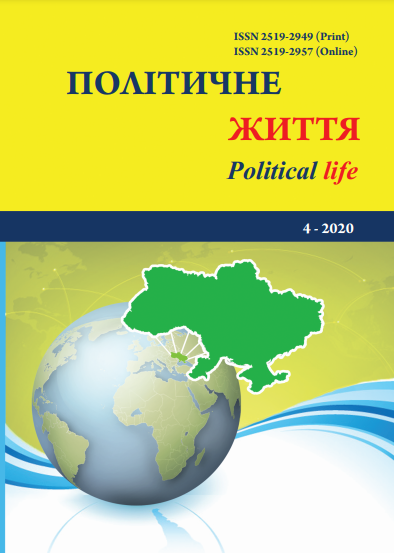Electronic Democracy: Transformation of Comprehension
DOI:
https://doi.org/10.31558/2519-2949.2020.4.3Keywords:
democracy; ICT; digital tools; social media; political communication; political participation; instrumentalism; axiological approachAbstract
The paper deals with the analysis of changes in the interpretation of the e-democracy concept main provisions. The author compares the formulations of ‘e-democracy’ definition, which have been proposed by reputable researchers over the past 20 years. The paper considers the peculiarities of interpretation of e-democracy’s essence at the main stages of its development, which were connected with the improvement of information and communication technologies (ICT). The author summarizes the opinions of scientists that at the present stage, which is defined as a network society, e-democracy is the main tool that ensures the effectiveness of democratic procedures and the quality of political decisions. It is predicted that the next stage of development will be AI-democracy (artificial intelligence democracy). The paper considers the basic principles and functions of e-democracy, which were established by the EU legislative acts. The main directions of the impact of new ICTs on democracy are shown, and the peculiarities of their implementation in different basic models of democracy are described too. The author analyzes the submodels of ‘wikidemocracy’, ‘liquid democracy’, ‘bubble democracy’, and ‘algocracy’, which are proposed by modern researchers. The paper outlines the latest threats to e-democracy. It highlights the negative changes in the perception of social media’s political role and shows how these changes have influenced the transformation of the understanding of e-democracy. The author illuminates the critique of the instrumentalist approach to the assessment of the essence and prospects of digital technologies implementation in the processes of political communication and participation. The paper presents the achievements of researchers who focus on the ethical aspects of ICT development. The author concludes that in order to restore the truth to democratic values, it is necessary to replace the instrumentalist approach with an axiological one. This transformation is especially relevant in terms of prospects for the transition of e-democracy to the next stage of its development – AI-democracy.
References
Hacker, K. L., & van Dijk, J. (Eds.). (2000). Digital democracy: Issues of theory and practice. London: Sage.
Coleman, S., & Norris, D. (2005). A new agenda for e-democracy. Oxford Internet Institute, Forum Discussion Paper, No. 4, January. DOI: 10.2139/ssrn.1325255. Available at: https://www.oii.ox.ac.uk/archive/downloads/publications/FD4.pdf.
Päivärinta, T., & Øystein, S. (2006). Models of E-democracy. Communications of the Association for Information Systems, 17(Article 37), 818–840. DOI: 10.17705/1CAIS.01737. Available at: http://aisel.aisnet.org/cais/vol17/iss1/37.
van Dijk Jan, Hacker Kenneth. (2018). Internet and Democracy in the Network Society. New York: Routledge. DOI: 10.4324/9781351110716.
Linder R., & Aichhozer G. (2019). E-Democracy: Conceptual Foundations and Recent Trends. In E. Hennen et al. (Eds.). European E-Democracy in Practice. (pp. 11- 45). 07 Nov. DOI: 10.1007/978-3-030-27184-8_2.
van Dijk, J. (2012). Digital democracy: Vision and reality. In I. Snellen, M. Thaens, & W. van de Donk (Eds.), Public administration in the information age: Revisited (pp. 49–61). Amsterdam: IOS-Press.
Tsagarousianou, R. (2000). Electronic democracy in practice: one, two, three... countless variants. Hermes, 26:230-242. DOI: 10.4267/2042/14779.
Council of Europe. (2009). Recommendation CM/Rec(2009)1 of the Committee of Ministers to Member States on electronic democracy (e-democracy). Available at: http://www.coe.int/t/dgap/democracy/Activities/GGIS/CAHDE/2009/RecCM2009_1_and_Accomp_Docs/Recom mendation%20CM_Rec_2009_1E_FINAL_PDF.pdf.
Dutton, H. W. (1999). Society on the line: Information politics in the digital age. Oxford: Oxford University Press.
Noveck, B. S. (2009). Wiki government: How technology can make government better, democracy stronger, and citizens more powerful. Washington, DC: Brookings Institution Press.
Pariser, E. (2011). The Filter Bubble: How the New Personalized Web Is Changing What We Read and How We Think. New York: Penguin Press.
Palano, D. (2019). The Truth in a Bubble: the End of ‘Audience Democracy’ and the Rise of ‘Bubble Democracy’. Soft Power, 6(2): 36-53.
Warren, A. M., Sulaiman, A., & Jaafar, N. I. (2014). Social media effects on fostering online civic engagement and building citizen trust and trust in institutions. Government Information Quarterly, 31(2): 291– 301. DOI 10.1016 / j.giq.2013.11.007
Zheng, Y. P., Schachter, H. L., & Holzer, M. (2014). The impact of government form on e-participation: A study of New Jersey municipalities. Government Information Quarterly, 31(4): 653–659. DOI: 10.1016 / j.giq.2014.06.004.
Meijer, A. (2020). Algoritmization and the key to building citizen trust. Ultrecht University News. 13 Feb. Available at: https://www.uu.nl/en/news/algoritmization-and-the-key-to-building-citizen-trust.
Cooper, T., & Thomas, J. (2019). Nature or Nurture: A Crisis of Trust and Reason in the Digital Age. London: Albany Associates.
Porotsky, S. (2018). How Social Media Stole an Election: An Examination of the Bilateral Assault on the Democratic System. Academia. 18 Nov. Available at: https://www.academia.edu/32532979/How_Social_Media_Stole_an_Election_An_Examination_of_the_Bilateral_Ass ault_on_the_Democratic_System.
Tenove, C., Buffie, J., McKay S., & Moscrop, D. (2018). Digital Threats to Democratic Elections: How Foreign Actors Use Digital Techniques to Undermine Democracy. Centre for the Study of Democratic Institutions of the University of British Columbia.
Leslie, D. (2019). Understanding artificial intelligence ethics and safety: A guide for the responsible desig

